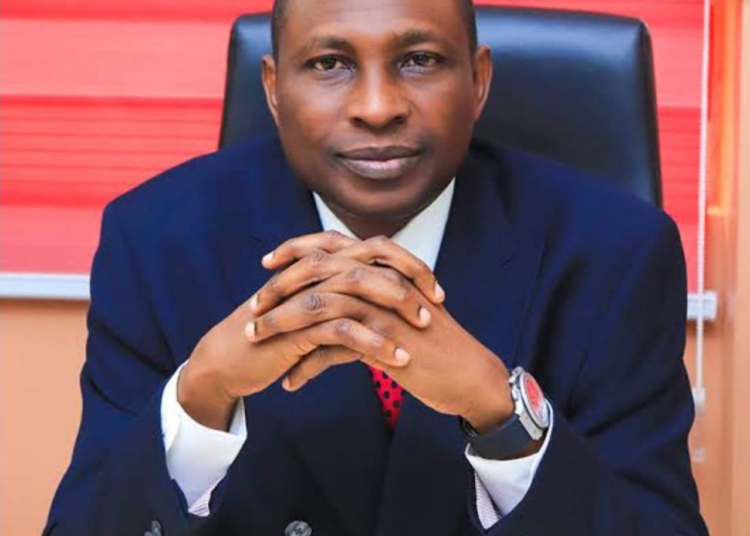The chairman of the Economic and Financial Crimes Commission (EFCC), Mr Ola Olukoyede has called for stronger collaboration from Designated Non-Financial Businesses and Professionals, DNFBPs with the agency against money laundering and in tackling the vulnerability of major economic sectors of the country to the crime.
Olukoyede stated this at the one-day outreach for high-risk Designated Non-Financial Businesses and Professionals, DNFBPs, organised by the EFCC in Ibadan with the theme: “Effective Implementation of AML/CFT/CPF Measures among DNFBP in Nigeria.”
Represented by the Acting Director, Ibadan Zonal Directorate of the EFCC, ACE I Hauwa Garba Ringim, Olukoyede appreciated the collaborative efforts of DNFBPs and other stakeholders towards effective implementation of the Anti-Money Laundering/ Combating Financing of Terrorism/Countering Proliferation financing, AML/CFT/CPF measures and enforcement of money laundering laws.
“Your presence here today signifies a more deliberate collaborative efforts and greater commitment towards effective implementation of the Anti-Money Laundering, Combating the Financing of Terrorism and Countering Proliferation Financing measures and enforcement of the Money Laundering Law,” he said, pointing out that DNFBPs such as lawyers, real estate agents, accountants, and dealers in solid minerals and precious metals play a vital role in the nation’s economy.
He added that these sectors and the professionals which were into legitimate businesses could be exploited by criminals to launder illicit funds.
He reiterated the need for DNFBPs to be more vigilant to protect their sectors from being used to launder illicit funds or become conduits for terrorism financing.
“This is why compliance with the Special Control Unit Against Money Laundering (SCUML) is essential. It ensures that your businesses are not used as conduits for financial crimes.
“In the EFCC, we have ramped up our enforcement, outreach, and intelligence-sharing efforts. Our goal is simple: to strengthen compliance across high-risk sectors and protect the integrity of our economy. Our work is guided by international standards, particularly the Financial Action Task Force, FATF recommendations,” he said.
He noted, “Nigeria’s standing in the global financial system depends significantly on how well we implement the Anti-Money Laundering/Countering Financing of Terrorism/ and Countering the Proliferation Financing measures across both financial and non-financial sectors,” as non-compliance exposes the nation to grey-listing and international restrictions which hinders economic development.
“The legal framework for AML/CFT in Nigeria is primarily anchored on the Money Laundering (Prevention and Prohibition) Act, 2022, the Terrorism (Prevention and Prohibition) Act, 2022, and other subsidiary regulations. These laws provide a strong foundation for identifying, tracking, and penalizing illicit financial activities.
“The Money Laundering (Prevention and Prohibition) Act, 2022, has given the EFCC legal powers to run the SCUML Unit with full regulatory and enforcement powers and has created an administrative sanction regime which never existed in the repealed law, hence, SCUML is now given the power to sanction any deviating and non-compliant Designated Non-Financial Businesses and Professions (DNFBPs).
“The Economic and Financial Crimes Commission EFCC, as the designated financial intelligence and law enforcement agency, has the statutory responsibility to investigate and prosecute financial crimes including money laundering and terrorism financing.
“The Commission also plays a central role in policy enforcement through the Special Control Unit against Money Laundering, SCUML, ensuring that Designated Non-Financial Businesses and Professions adhere to preventive measures such as risk assessments, customer due diligence, and suspicious transaction reporting,” he said.
He added that EFCC recognises the need to strengthen capacity and deepen understanding across all sectors, especially among non-financial businesses.
“This engagement is a step in that direction, designed to empower you with the tools and knowledge required to detect and prevent financial crimes.
“Let us continue to strengthen our collective resolve. With your cooperation, Nigeria can rise above the threats of illicit finance and reclaim its credibility in the international financial space.”
He urged participants to be partners in this fight, stressing that Anti-money laundering compliance is not just a legal requirement but a moral and patriotic duty. “Dirty money only thrives in silent systems. When professionals speak up and follow the rules, crime dies in the dark,” he said.
He emphasised that all DNFBPs were expected to make their transactions open to its regulation through SCUML, saying, “One of the bases of supervising these businesses by SCUML is to check money laundering practices which seeks to prevent and prohibit any form of transaction considered suspicious by the regulatory authority and it is pertinent to state that the new money laundering Act is stiffer and may put many DFNBPs in trouble if not complied with.”
Olukoyede assured that SCUML will continue to take all the DNFBPs through certain processes and procedures involving sensitisation, guidance, warning, transactions check and monitoring.
The Head of SCUML, Ibadan Zonal Directorate of the EFCC, ACE11 Oluwatoyin Ehindero, who represented the EFCC Director of SCUML, DCE Harry Erin, stated that all relevant stakeholders were making deliberate efforts to ensure that Nigeria exits FATF Grey List.
“We need your sincere support to achieve the feat of winning the war against money laundering and financing of terrorism in the country.
“The EFCC, under the leadership of Ola Olukoyede, has left no stone unturned in the fight against money laundering and financing of terrorism. I want to implore us to do our best and do the right thing at all times,” she stated.
Real Estate Developers Association of Nigeria (REDAN), car dealers, estate surveyors, valuers, dealers in precious stones and metals and hoteliers, accountants and Gemstones Dealers Association were participants in the event.
The representative of REDAN, Olu Falodun appreciated the EFCC for the workshop, stating that it was an eye-opener on money laundering and terrorism financing.
He emphasised that the cooperation of all stakeholders against money laundering was needed for Nigeria to exit FATF’s Grey List.





